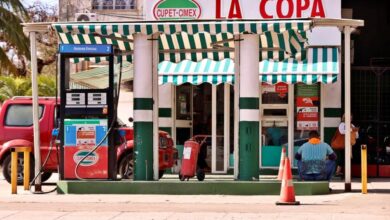Here’s How Iran and Russia Have Managed to Circumvent Western Sanctions
Sanctioned countries often resort to strategies that allow them to obtain dollars, despite restrictions, or point to the strengthening of other currencies as a solution. Here's how Iran and Russia have skirted the punishments.

Photo: Presidential Executive Office of Russia
LatinAmerican Post | Luis Angel Hernández Liborio
Listen to this article
Leer en español: Así es como Irán y Rusia han logrado sortear las sanciones de Occidente
While the war in Ukraine continues to advance, NATO member countries, mainly the United States, continue their sanctions offensive on Russia. The erosion to which the Russian economy is supposedly being subjected is not as severe as expected, leading them to ask, how do the sanctioned countries get around the restrictions they are under and continue to supply themselves?
Circumventing the sanctions
Cuba, North Korea, Iran, Myanmar, and Russia are countries that have historically been on the United States' blacklist. The number of sanctions differs from one to the other, in addition to focusing on specific aspects of their economies that may affect them the most. However, over the years these countries have become “specialists” in evading sanctions and obtaining in one way or another the products and resources necessary to survive despite the restrictions.
The Cuban case is one of the most representative. The blockade maintained by the US government at all levels has caused a great impact on the island's economy, losing its last great support with the disappearance of the USSR has deteriorated. Even so, the regime has survived the test of time thanks to the support of allies such as Russia, Venezuela, Brazil, Bolivia, and more recently Argentina and Mexico. The support has consisted of hiring Cuban doctors who give part of their income to their government; oil and gas, as well as products for agriculture.
Business Alliances and Self-Sufficiency
But the Cuban case is notably different from that of Russia. The Eurasian country is a nuclear, military and oil power. European and US sanctions target its energy resources. However, Russia has long prepared for this moment of war. On the one hand, Russia is aware of Europe's dependence on its gas and oil, so in 2022 Putin announced that, given the freezing of Russian dollar reserves abroad, energy resources would be charged in rubles. Additionally, countries like Pakistan have paid for Russian oil in yuan in a frank confrontation with the dominance of the dollar. This gave a breather to the ruble, which has been in a tailspin since the start of the invasion, compounded by the effects of the pandemic and the subsequent economic crisis.
But this action is not enough, Russia has strengthened its internal market, especially with the departure of multinational companies. It has had to force an “import substitution” model by creating alternative versions of products or giving way to Russian products that already existed, but were not dominant due to the presence of foreign companies. This is forced self-sufficiency. Russians have been able to do without mainly luxury items, but in the long run, if basic goods are in short supply, their reality will be different. Russia has two great allies with whom it strengthens its trade ties: China and Iran. With the Chinese there is an important issue: the strengthening of the yuan as an alternative to the dollar. Russia has found the perfect moment to support the Chinese initiative, Trump's threats and the commercial hostility that the United States has shown in the last decade have pushed the Asian power to raise the possibility of a de-dollarized world.
The Black Market
One of the big unknowns is how North Korea's economy and nuclear program have survived despite sanctions. One of the answers is the black market. For decades there has been talk of how the North Korean regime has used the international black market to traffic drugs, weapons, jewelry, property, luxury items and currently cryptocurrency. This in order to obtain resources, given the impossibility of doing so by conventional means. Hacking and tourism are other ways the country earns foreign currency for trade and to finance its expensive nuclear program.
You can also read: Why Was AMLO Never the Latin American Leader Many Expected?
China, the Great Ally
Iran and Venezuela, sanctioned by the United States and the European Union, have also found a powerful ally in China. For the Asian country, it represents an opportunity to reduce the power of the North Americans in the Middle East and South America, reducing the dependence of these oil countries on US currencies and supporting their plans to strengthen the yuan. A few days ago, Russia and Iran signed an agreement to create an ambitious trade corridor that includes a railway, port strengthening, and logistics as an alternative to Western trade routes. This seeks to speed up the movement of Russian and Iranian products to the India and Asia Pacific also avoiding any restriction through conventional channels.
Finally, the importance of Iran and Venezuela as oil producers has caused the United States to lower its guard and open up to dialogue on sanctions. Iran has been in an easing-out relationship with the Americans for the past 10 years, who have imposed and withdrawn sanctions that coincide with periods of confrontation and brief talks. Similarly, the war with Ukraine motivated the United States to open up to dialogue with Venezuela, which represented a respite for the pressured regime of Nicolás Maduro, without losing its close relationship with China, Russia, and Iran. Thus, China tries to change the relationship of the dollar with the world economy and with the weight it has in sanctions. If the dollar ever loses its hegemony against the yuan, the destructive power of sanctions may be greatly reduced or limited. In what way could the United States put pressure on its enemies if not with an economic issue?




